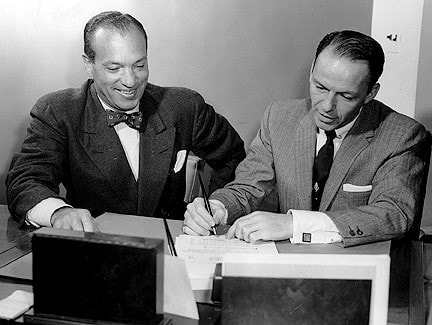|
Excerpted From Beating The Odds, the autobiography of ABC founder Leonard Goldenson
OTHER RECOLLECTIONS: Bob Weitman The Paramount Theatre was in the Paramount Building, 1501 Broadway. And that theater was then grossing, with first-run pictures, $7,600 a week, which was nothing. Almost depressing. It was left to me to figure a way out of this. I told Frank Freeman we would put in a new band for the run of each show, two weeks, three weeks, whatever. And I described all this to him. He says, “None of these dancing girls where you’ll need all those stagehands.” He knew everything. I said, “Oh, no. We’re going to make new deals.” The long and the short of it, I called Dick Walsh, the president of the International Federation of Stage Hands and Operators. He was the guy that took on the gangsters, Bioff and Browne. He says, “Hello, kiddy, aren’t you the kid that was out at the Brooklyn Paramount?” I said, “Yes. I’d like to see you. Can you come down tonight at midnight?” He came down, and all we’ve got is a work light and emptiness. I said, “Push that button.” He pushes the button and the curtains close. I said, “Push the other button.” He pushes that button and the pit comes up. I said, “You see that bank of lights in front of the balcony? That’s the lighting and the projection room.” He says, “I know what you’re going to ask: How come six stagehands?” That’s how I got rid of the extra stagehands. And we became fast friends. Then I went with Lenny Goldenson to meet with Mr. James Caesar Petrillo. Little Caesar, the guy who ran the American Federation of Musicians. He was an old pal of Barney Balaban, they grew up together in Chicago. Petrillo’s kid died of peritonitis, and nobody ever explained this to him correctly, and from then on he was so afraid of germs he wouldn’t shake hands. When we came into his office, he opens a desk drawer and takes out a pistol. Six-shooter of some kind. Just lays it out on the desk, and we go on about our business like it never happened. So I tell him, we’re going to have a new band policy, play all the bands, and if it hits, he’ll be a tremendous man in the country because musicians will be working. He said, “You listen to me, college boy. If you have Local 802 musicians in the band, you’ve got no problem. If you have a band with fifteen fellows that are 802, one or two are not but they’re traveling, you’ve got to pay standbys, for a total of the number in the band.” So I said to him, rather irately, “You’re crazy. You’re in America, you know.” He turns to some guy, I don’t know him from third base, and says, “How do you like this kid?” I said, “I don’t care if you like me.” He said, “I’ll tell Barney, and then he’ll call, and you’re out of a job.” I said, “That’s up to you. But I’ll tell you something. I’m not going to pay that standby. That’s featherbedding.” I didn’t know what the hell featherbedding was, but I’d read something about it. “I’m not going to pay for nothing. You give me musicians, and I’ll pay them, but let them stand on the grand stairway and play as people walk into the theater.” He said, “I never heard of that before.” I said, “Well, I just heard of it myself. I’m not going to pay and not get musicians. You do anything you like, but if this thing hits, your music guys are going to have a lot of work.” He says, “Let’s have a drink. This is show business, you know.” We sat in the bar at the Longchamps. He had beer, we had an iced drink, and we went on. The first band that we booked was Casa Loma, Glen Grey, and we charged 25 cents until 1:00 p.m. My objective was to create a want and a panic, make people think they get in for nothing. The theory behind it, if they’re buying these stinking pictures, $7,600 per week, and you give them that plus a popular band for a quarter until 1:00—at any rate, we took in $56,000 the first week. We had an accordionist who would play in the lobby. We put musicians on the sidewalk. The entertainment started the moment they put their two bits on the window sill. Afternoon prices were higher, evenings still higher. This thing started to mushroom incredibly. We had a huge sign in the lobby, “Vote for your favorite bands.” This thing became a big smash. * * *
Bob Weitman’s new policy was tremendously successful. He booked such bands as Glenn Miller, Tommy Dorsey, Eddy Duchin, Woody Herman, Charlie Spivak, and Stan Kenton. At the time, few of these dance bands or their leaders were well known. But playing the Paramount Theatre put them before the New York press, helped them to get bookings on network radio shows, and thus exposed them to a wide audience. It put them on the map. They became the biggest bands in America and the world.
The Paramount’s Depression-era talent budgets didn’t allow for many big stars. So Weitman booked unknowns and made them stars. One of his biggest successes was a skinny New Jersey kid with a big voice named Frank Sinatra. Bob was a master showman, who knew how to promote a personality. He set out to make Sinatra an instant success by recruiting a few dozen teenage girls to sit in the front rows for each performance. In exchange for free admission and choice seats, they were expected to shriek and make a big fuss when Sinatra appeared on stage and began to sing. Before each performance, Weitman took two or three of these girls aside, handed each a dollar bill—a healthy sum for a Depression teenager—and told them that when Sinatra crooned, they were to swoon. After a few well-publicized front-row faints, newspaper reports of Sinatra’s mesmerizing voice and its effect on adolescent girls soon propelled him to stardom. Using other kinds of promotion, Weitman did the same for such unknowns as Danny Kaye, the Andrews Sisters, Tony Martin, Perry Como, Nat King Cole, Frankie Laine, Billy Eckstine, Tony Martin, and Betty Hutton. They all got their start at the Paramount. Before leaving ABC, Bob Weitman went with me to see Frank Sinatra, then appearing at the Riviera Club across the Hudson River in New Jersey. Weitman had made Sinatra a star in the 1930s, but when we went to see him, Frank’s career was in the doldrums. He’d just finished working on From Here to Eternity, but it was months from release. Nobody yet knew it was going to be the smash hit that would restore Sinatra to superstardom. Sinatra was married to Ava Gardner. They’d been living in Spain, taking it easy. He’d become her stooge over there, lying around all day, partying at night, and not working. He finally came back to America to film From Here to Eternity. During that period Ava didn’t call or write him, and there were all sorts of rumors about her running around with various men. There may have been nothing to the gossip, but Sinatra couldn’t handle it. He was still very much in love with her, and the day I dropped in to see him, he was in tears. I said, “Frank, do you have any money?” He said no. I said I wanted him on ABC. Perhaps we could work out a deal where, instead of a salary, he could take his pay as a capital gain. (Income tax upper brackets were then about 70 percent, capital gains only 25 percent.) Sinatra told me to talk to Abe Lastfogel. Eventually we agreed to form a production company together. ABC put up $3 million in cash. Sinatra put up his profit-sharing interest in certain movies he’d already made or had contracted to do. Now, everyone in the picture business knows that accounting practices being what they were—and still are—it’s rare that talent ever sees much in the way of profits, even with a blockbuster hit. So Sinatra made $3 million when he had nothing in the bank. This was not from the kindness of my heart. It was business: A musical variety show hosted by Sinatra had great promise. We put it together as a thirty-minute program for 9:00 on Friday nights. After we made the deal with Sinatra, From Here to Eternity was released. It was a big hit. Sinatra won an Oscar. He got all kinds of offers. And he kissed off the television show. He paid it scant attention, devoting hardly any time to rehearsals. Even when he showed up, the day before broadcast, he just went through the motions. He spent most of his time kibitzing backstage with his Rat Pack retinue. With Sinatra doing nothing to make it work, the show flopped. It was poor television, and people wouldn’t watch. The situation was not hopeless. I felt we might work out something in place of a weekly show. Perhaps, I thought, a series of specials. Or something else that would allow ABC to get some return on a $3 million investment. So I called Abe Lastfogel and made an appointment to sit down with Sinatra at The Sands in Las Vegas. Tom Moore, then in charge of programming, came along with me. © 1991 Leonard H. Goldenson and Marvin J. Wolf
0 Comments
Your comment will be posted after it is approved.
Leave a Reply. |
FROM Marvin J. Wolf
On this page are true stories, magazine articles, excerpts from books and unpublished works, short fiction, and photographs, each offering a glimpse of my life, work and times. Your comments welcome. © Marvin J. Wolf. All rights reserved. Archives
October 2023
Categories
All
|
|
|
Member, Military Writers of America
|
Website © 2016 Marvin J. Wolf. All rights reserved on website design, images and text. ꟾ Updated regularly.
Design by Andesign. |
Professional Reader, NetGalley
|


 RSS Feed
RSS Feed
